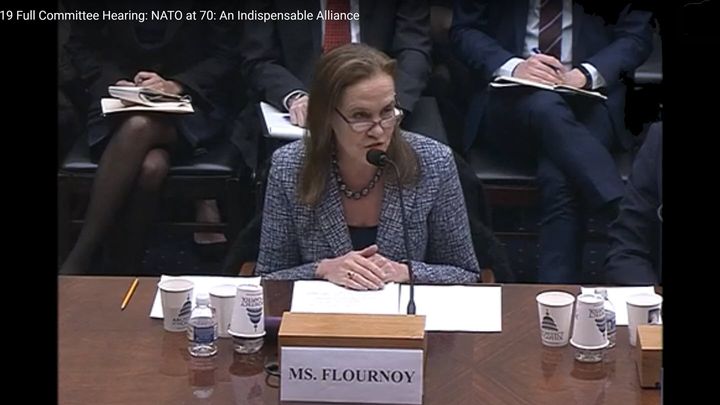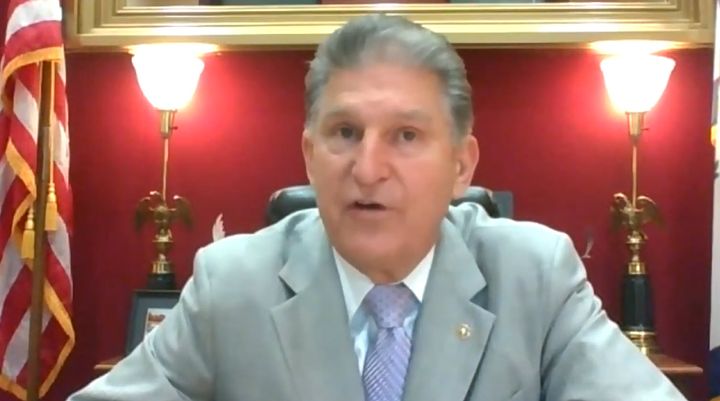In March of last year, former Pentagon official Michèle Flournoy testified before the House Foreign Affairs Committee about her views on NATO.
“Now is not a time to disparage, abandon, or nickel-and-dime NATO,” Flournoy said. “As we face an increasingly complex set of security challenges and a period of intensifying competition with a revisionist Russia and a rising China, now is the time to double down and make the shared investments necessary to adapt and strengthen this invaluable alliance for the future.”
Flournoy identified herself to the committee as a former under secretary of the Defense Department and a co-founder and managing partner of the strategic communications firm WestExec. She declined, however, to mention in her truth-in-testimony disclosure another position she held that posed a possible conflict for her testimony in support of continued NATO funding. Flournoy is a board director of Booz Allen Hamilton, an information technology firm that is a contractor for the NATO Communications and Information Agency.
All non-governmental witnesses to congressional committees have to file truth-in-testimony disclosures including details about funding received by the organizations they represent, in order to increase transparency about affiliations that may have influenced their perspectives. But witnesses like Flournoy routinely flout this requirement by declaring that they are testifying in a personal capacity and not on behalf of their employers.
To close this loophole, the House Rules package that was adopted this week for the new session of Congress requires all witnesses disclose whether they are the fiduciary of any organization with an interest in the subject matter of the hearing. According to the resolution text, positions requiring disclosure include, but are not limited to, director, officer, advisor, or resident agent.
The new rule was proposed by California Democrat Katie Porter, the second-term rep who has gone viral on multiple occasions for her sharp and insistent questioning of congressional witnesses.
“Hearings are opportunities to get answers for the American people—we need to know about foreign influence or any risk of self dealing with the witnesses called before Congress,” Porter said in a press announcement. “The new rules will also give members of Congress the opportunity to raise questions about special interests in the course of hearings.”
Watchdog group Project on Government Oversight (POGO) has been working to highlight the loopholes in witness disclosures for several years and Mandy Smithberger, director of the group’s Straus Military Reform Project, supports the new rule.
“Congress should know whether the advice they’re receiving is influenced by a witness’s financial interests,” Smithberger said. “Expanded disclosure allows Congress to assess conflicts of interest and how that colors the information they receive on issues.”
A separate section of the Rules Package calls for the House Clerk and the Committee on Administration to undertake efforts to improve the electronic document repository, including the posting of witness disclosure forms. Adding the forms to the depository would make it easier to search for disclosures and possibly to browse through them.
In some cases, committees have not made their witnesses’ disclosure forms available on their website for public review. For example, in September, Robert Work testified before the Committee on Armed Services Subcommittee on Intelligence and Emerging Threats and Capabilities on the use of artificial intelligence in national security issues. Work identified himself as the former deputy secretary of the Department of Defense, but his disclosure was not posted online so we don’t know if he disclosed to committee members that he is a board member at Raytheon, which has contracts with the Defense Department related to AI. The rules package requires the disclosures to be publicly posted 24 hours before hearings.
The new House rules package contained several other provisions that aim to increase transparency and tighten ethics guidelines. Amendments offered in committees will have to be posted online within 48 hours, and adopted amendments must be posted within 24 hours. Former members of Congress who have been convicted of crimes related to their elections or their service in Congress will no longer be allowed on the House floow, though they may still be allowed in the House gym. And it directs House members, delegates, the resident commissioner, officers, and employees to comply with rules promulgated by the House Ethics Committee that they can not serve as an officer or director of a public company.
Read more from Sludge:



